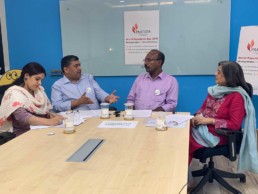Medical Termination of Pregnancy Act in “time warp”
“A liberal Medical Termination of Pregnancy Act was passed in India 48 years ago, in 1971. It has stayed in a “time warp” since, ignoring the advancement in medical technology. It is time, now more than ever, to amend the MTP Act, make it women centred, rights based and contemporary so that women in India can safeguard their health and exercise their sexual and reproductive rights”, VS Chandrashekar, CEO, FRHS India.
This week the Pratigya Secretariat is using the Facebook and Twitter handles: @PratigyaRights and @RightsPratigya to track how the Act came into being, when it came into being and how it has stagnated. We are also showcasing quotes from our Campaign Advisory Group members.
#TimeforChange #48yearsofMTP
The Medical Termination of Pregnancy Act (MTP) was passed by the parliament on August 10, 1971 to allow abortion up to 20 weeks under certain conditions. Prior to the MTP Act, induced abortion was a criminal offence under Sections 312-316 of the Indian Penal Code (IPC) except when the continuation of pregnancy put the woman’s life in danger.
After the MTP Act came into force, the conditions under which abortions were permitted were quite liberal and it was touted as a historic day for women’s health. However, since that day not much has changed, despite advancement in technologies and the changing abortion landscape in India.
In 2014, the Government of India released the draft MTP amendment bill to do the following:
- Allow first trimester abortion on demand (a right)
- Expand provider base to include qualified and trained nurses and indigenous system of medicine providers to provide first trimester abortions
- Permit failure of contraceptives as a ground for all women, not just married women
- Increase the gestation limit to 24 weeks for fetal abnormalities and rape
- The bill, if passed can bring much needed reform, however it is yet to be placed in Parliament. Through the week-long social media campaign, Pratigya Campaign is tracking the timeline and drawing attention to the MTP Act and how amendments can breathe fresh life into the outdated Act.
You can follow this week’s Pratigya Campaign via the Facebook and Twitter channels: @PratigyaRights and @RightsPratigya respectively. They are also using the hashtags: #VoiceforChoice #PratigyaRights #TimeforChange and #48yearsofMTP.
Pratigya Campaign marks World Population Day with Social Media Campaign
Themed ‘Family Planning is a Human Right: Universal Access to SRH’, the Digital Campaign ensued for ten days, culminating in the Facebook Live event, which saw enriching and lively discussions among the speakers and the audience. It was moderated by Ms Anjali Nayyar, EVP, Global Health Strategies, and the speakers included Ms Prabhleen Tuteja, Director Programmes, The YP Foundation; Mr Vinoj Manning, CEO, Ipas Development Foundation, and Mr VS Chandrashekar, CEO, Foundation for Reproductive Health Services India.
Sexual and reproductive health and rights (SRHR) are an integral part of the right to the highest attainable standard of health and integrity related to other human rights, which countries are obliged to uphold under international law. During the event, speakers discussed the importance of viewing family planning and access to SRHR as a human right and shared the role that youth can play.
Ms Prabhleen Tuteja, Director Programmes, The YP Foundation, said: “Youth cannot be ignored while making family planning decisions, they form an integral part. However, provider bias is a major hindrance towards making SRH services accessible for youth. The youth bulge is significant in India and getting them together to stabilise India’s population is crucial”.
Mr Vinoj Manning highlighted the need for balanced pre- during- and post- counselling for women seeking contraceptive services. In addition, it was emphasised that we recognise the need for contraception among the unmarried, supplementing family planning interventions with contraceptive access.
The event was streamed at Pratigya Campaign’s Facebook and Twitter channels @PratigyaRights and @RightsPratigya respectively. The Facebook Live event received 940+ views, reached 2000+ people and was shared over 30 times.
Six Abortion Myths Busted
“There is nothing wrong with Change, if it is in the right Direction”.
Winston Churchill
Over 3500 women die annually in India due to unsafe abortions. To prevent these unnecessary deaths, it’s important to share correct information on abortion and bust some existing myths. Let’s start with busting six of them.
Myth # 1 Abortion is not legal in India!
Fact: Abortion is Legal in India!
Abortions have been legal in India since 1971. Abortion services are governed in our country by Medical Termination of Pregnancy (MTP) Act, which has recently been amendment and is in place as the MTP (Amendment) Act 2021. As per the amendments, abortion is permissible to all women (including unmarried women) on grounds of contraceptive failure up to 20 weeks, while special categories of women (survivors of sexual abuse, minors, victims of rape, incest, differently abled women) can avail services up to 24 weeks. Women/couples can now seek termination of pregnancy, anytime during the gestation period for foetal anomalies, as diagnosed by the medical boards.
Myth # 2 If everyone uses Contraception there will be no need for abortion
Fact: Even if everyone uses Contraception, there will be a need for abortion
Since contraceptives are not 100% effective and each method has an inherent failure rate , even if contraceptives are used correctly by all couples who want to avoid a pregnancy, women will still end up with an unplanned pregnancy. In addition, survivors of sexual abuse/rape and pregnancy affecting the health and life of women would need to terminate a pregnancy. “An estimated 33 million contraceptive users worldwide are expected to experience accidental pregnancy. Some end up in unplanned births and some are terminated by induced abortion” – WHO technical and policy guidance for health providers on Safe Abortion
Myth #3 Abortion is a complex and risky medical procedure!
Fact: Abortion is a safe and simple procedure
Advancement in technology through introduction of manual vacuum aspiration, electric vacuum aspiration and medical abortion has made abortions simpler and safer. As per WHO technical and policy guidance for health providers on Safe Abortion “When performed by skilled providers using correct medical techniques and drugs, under hygienic conditions, induced abortion is a very safe medical procedure”. In fact it’s safer then child birth.
Myth #4 Abortions can affect woman’s future pregnancy!
Fact: Abortions do not affect woman’s future pregnancy
Experts globally believe that women who have had an abortion or more than one abortion by a trained healthcare professional usually do not have fertility issues. Currently there is no evidence to show that abortions can cause infertility.
Myth #5 Your partner/husband/ guardian’s consent is required!
Fact: Only the woman’s consent is required
As per the MTP Act, if the women is above the age of 18 only her consent is required. There is no need for a consent from her partner/husband or guardian. Only in the case of a minor (below the age of 18) a guardian’s consent is required.
Myth #6 All abortions are sex selective
Fact: An overwhelming majority of Abortions are for reasons other than sex selection
A study by Ministry of Health and Family Welfare informs us that only 9% of all the abortions performed in India per year are sex selective in nature. This means that 91% of abortions happen due to various other reasons and are not linked to sex selection. It is estimated that between 85-90% of all abortions in India are first trimester abortions (before 12 weeks gestation). Ultrasound can detect the sex of the foetus only around 13-14 weeks gestation.


